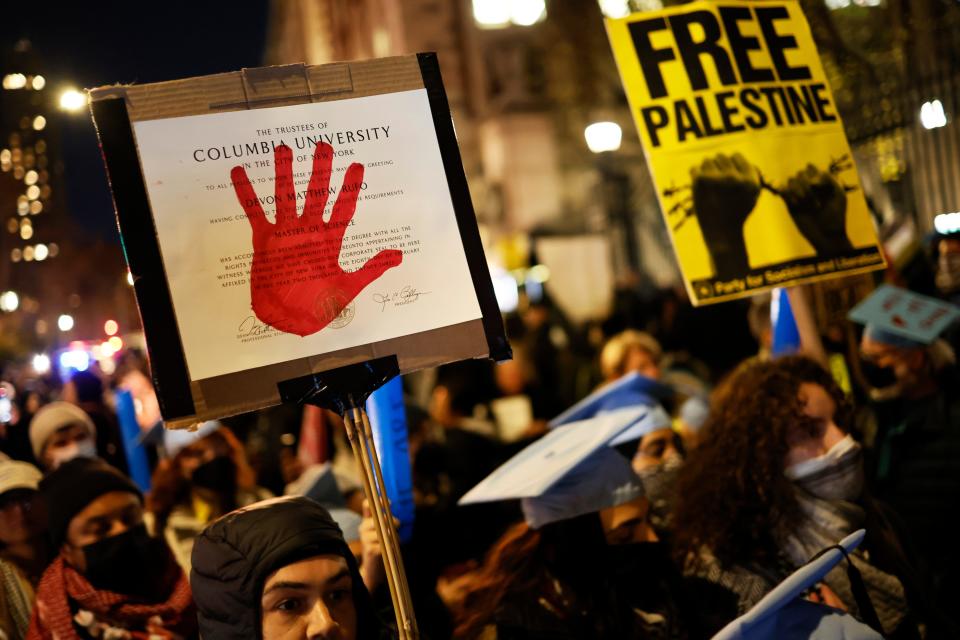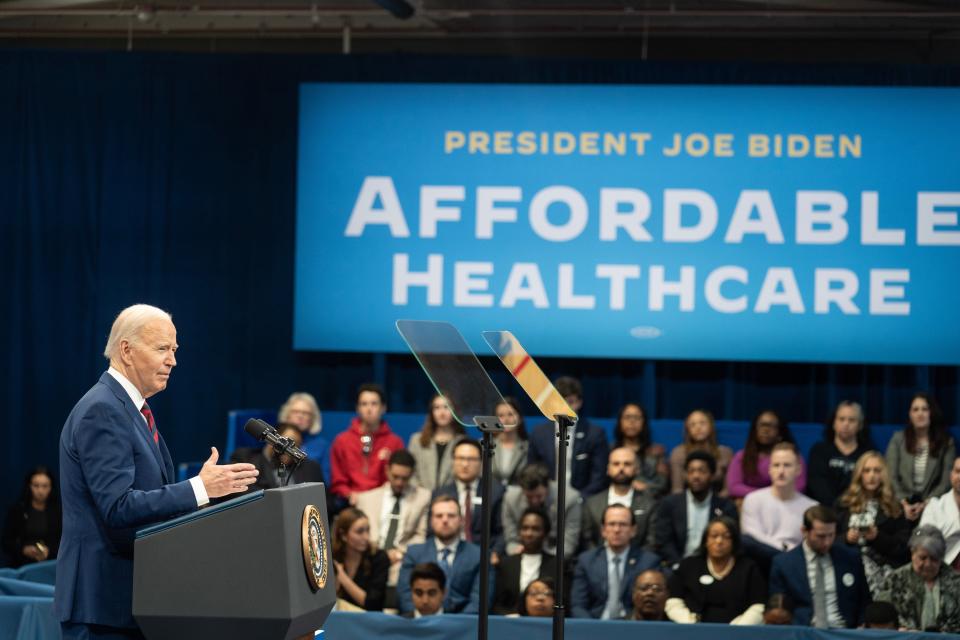Gen Z wants no part of Biden's unceasing support of Israel as civilian deaths in Gaza mount
Cameron Jones is a sophomore at Columbia University. He has family in Israel and has visited more than once, but he’s also a member of the college’s chapter of Jewish Voice for Peace (JVP) and a vocal opponent of Israel’s attacks on Gaza.
His family abroad doesn't know about the organizing he's done, nor do they know that he is one of the plaintiffs in a lawsuit against Columbia after the JVP chapter was suspended in November.
Since Hamas strikes prompted Israel to begin attacking Gaza on Oct. 7, Jones and other students – mostly queer people, people of color and women – have been organizing to demand Columbia divest from companies and institutions that support Israel.
“I feel as though I have more of a duty to stand up against what is wrong,” Jones told me.
Almost 33,000 Palestinians have died in the past six months. The images and information coming out of the Gaza Strip, like the Israeli airstrike that killed seven aid workers last week, have been difficult to see.
Calling for an end to the conflict is important to the nation’s youngest voters, and President Joe Biden needs to take a firm stance on the issue ahead of the election. He is one of the most powerful men in the world; what he says can impact how Israel is seen by its peers. If the president called for a cease-fire, even a short-term one, it would likely be taken seriously by Israel. Biden has come out against the dangers that civilians in the region are facing, but it's not enough.
Polls show Gen Z supports Palestine
If your social media feed is anything like mine, you’ve seen documentation of the catastrophe – of buildings after bombings, families in refugee camps and glimpses into the lives of people who have died.
The cause has even reached dating apps, where users are specifying their stances on Gaza or simply including the Palestinian flag in their bios.
This social media campaign is probably why so many young voters are supporting Palestinians compared with previous flare-ups in the region.
In a New York Times/Siena poll from December, 55% of respondents ages 18-29 oppose the United States sending more aid to Israel. Another poll from Quinnipiac University in November found that 52% of voters under 35 are more sympathetic to the Palestinians.
However, not everyone in this demographic is on the same page. An NPR/PBS NewsHour/Marist Poll conducted in October shows that 48% of millennials and Generation Z think the country should publicly support Israel, while 12% of this group think that the United States should publicly criticize Israel.
Opinion alerts: Get columns from your favorite columnists + expert analysis on top issues, delivered straight to your device through the USA TODAY app. Don't have the app? Download it for free from your app store.
A whole generation is coming of age, and some of us are questioning the years of funding our government has sent to Israel. The United States has given $130 billion worth of aid since Israel's founding after World War II.
Last year, we sent Israel $3.8 billion in military assistance. After the Hamas attacks, Biden requested an additional $14 billion for Israel.
We want to know why we are still sending money despite the horrific scenes playing out in front of us. We don’t want to be complicit in the human rights violations we are seeing on social media every day.
For some, the conflict is personal
Layla Saliba is a graduate student at Columbia University and a Palestinian American. Multiple family members of hers have died in Gaza since Oct. 7.
She and Jones said they have been the targets of harassment because of their activism on behalf of Palestinians. Both told me they've appeared on Canary Mission, a website that exposes personal information of Gaza supporters. Saliba said she had to block one Columbia professor who harassed her on X, formerly Twitter.

Saliba, who grew up wary of talking about her Palestinian background, noted that she has seen more pro-Palestinian conversation in recent months than ever before.
“It’s the first time we’re seeing something like this on social media, on our phones, every day,” Saliba told me. “And I think the level of death and destruction we’re witnessing – I don’t think the human brain is designed to deal with that. And this is something that is being funded by our tax dollars.”
With no cease-fire in Gaza, Muslims like me struggle with guilt and rage this Ramadan
Jones, on the other hand, is one of many young Jewish Americans who have been organizing to support the Palestinian people and bring attention to the cause through acts of civil disobedience that have disrupted travel routes and daily routines.
Hundreds of young employees at Jewish organizations have signed a letter addressed to Biden and Congress demanding a cease-fire.
For Jones, the claim that criticizing Israel is antisemitic is “disheartening.” He noted that it makes it difficult to call out “actual” antisemitism in the process.
“People are going about calling ‘anti-Zionism’ antisemitism, wearing a (traditional Palestinian scarf) kaffiyeh antisemitic,” Jones told me. “All these things that really aren't antisemitism, but they’re painting it as that.”
Even as a person without direct ties to Israel or Gaza, conversations have been fraught. It's frustrating that some people won't engage in genuine conversation about the destruction we're seeing on a regular basis. It's draining to face the reality of war as it unfolds and upsetting to know that we have contributed to that suffering.
Biden should be paying attention to all of this

Biden and his campaign staff should be taking the call to action seriously. Voters in Michigan showed their disapproval of Biden’s inaction in the region by voting “uncommitted” in the state’s Democratic primary. Since then, voters in other states have used the protest vote as a means of voicing their feelings on Gaza.
Gen Z progressives are also trying to get Biden’s attention. In March, a coalition of youth movements sent a letter to the president outlining the youth agenda. It included an ask of Biden to call for a cease-fire. Gen Z for Change, one of the groups involved, has also been helping voters email their elected officials in support of a cease-fire.
Gaza is redefining the Christian vote. Biden and Trump better listen.
Recently, the president acknowledged some pro-Palestinian protesters at a rally in North Carolina, saying that they “have a point” and that more care is needed in Gaza. Vice President Kamala Harris is on record supporting a six-week cease-fire. Both are steps in the right direction.
On the other hand, Biden is the sitting president of a world power. When he speaks, other leaders listen. Because of this, he needs to take an active stance in support of a cease-fire in the region. It isn’t enough to have Harris deliver the message.
We just want to know why our tax dollars are supporting this and how we can do something about all of the tragedy we are seeing in real time, day in and day out, since Oct. 7. The president could ensure more votes in the fall if he takes our concerns seriously.
Follow USA TODAY elections columnist Sara Peque?o on X, formerly Twitter, @sara__pequeno and Facebook facebook.com/PequenoWrites
You can read diverse opinions from our Board of Contributors and other writers on the Opinion front page, on Twitter @usatodayopinion and in our daily Opinion newsletter.
This article originally appeared on USA TODAY: For Gen Z, Gaza has become personal. Biden should take that seriously
